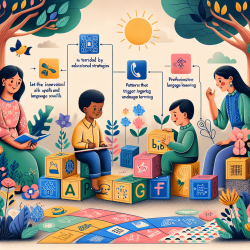Understanding the Research
A study conducted by Cogo-Moreira et al. (2013) explored how different domains of musical perception—specifically, temporal and melodic—can predict the word-level reading skills of children aged 8 to 10 with reading difficulties. The researchers used the Montreal Battery of Evaluation of Amusia (MBEA) to assess musical perception and correlated these results with the children's ability to read words and non-words.Key Findings
The study revealed:- Both general musical perception and the melodic domain significantly predicted word-level reading skills.
- Phonological awareness was also a strong predictor of reading fluency.
Practical Applications for Practitioners
Here are some practical ways you can incorporate these insights into your therapy sessions:1. Integrate Musical Activities
Use musical activities that emphasize melody and rhythm. Singing songs, clapping to beats, and playing simple musical instruments can enhance children's phonological awareness and, consequently, their reading skills.2. Focus on Phonological Awareness
Incorporate activities that improve phonological awareness, such as rhyming games, segmenting words into syllables, and blending sounds. These activities are foundational for reading development and can be effectively paired with musical exercises.3. Use Music to Enhance Engagement
Music can make therapy sessions more engaging and enjoyable for children. Use background music during reading exercises or create songs out of reading material to maintain interest and motivation.Encourage Further Research
While this study provides promising evidence, more research is needed to fully understand the mechanisms behind the relationship between musical perception and reading skills. Encourage your colleagues and students to explore this area further and consider conducting your own studies to contribute to this growing field.To read the original research paper, please follow this link: Pathway Evidence of How Musical Perception Predicts Word-Level Reading Ability in Children with Reading Difficulties










